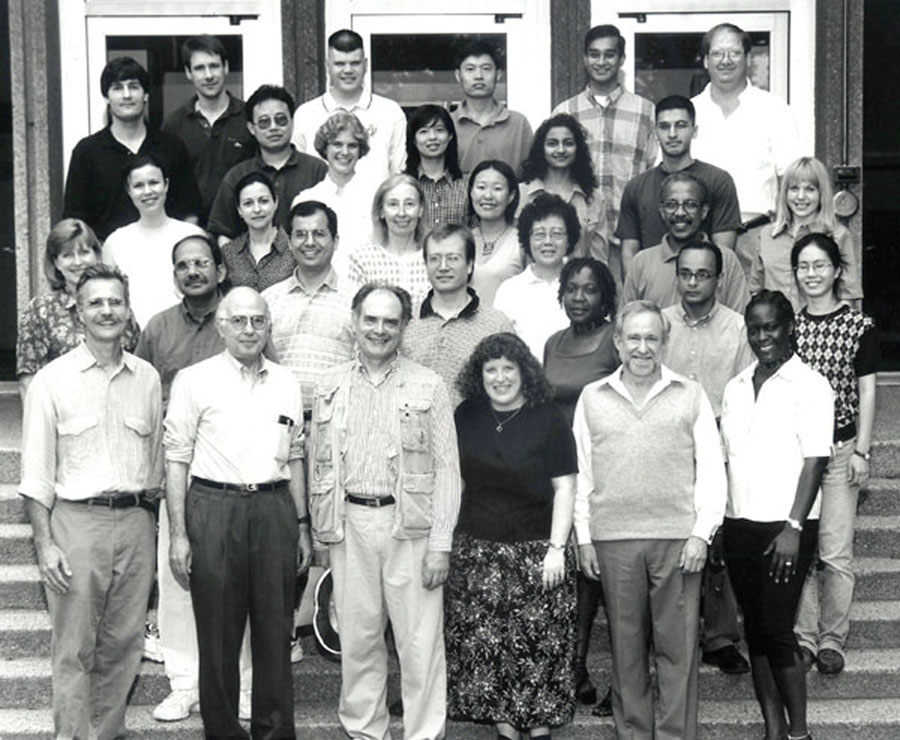
The Laboratory of Molecular Pharmacology has five Principal Investigators: Mirit Aladjem, William Bonner, Kurt Kohn, Yves Pommier and John Weinstein.
LMP Research: The main focus of this Laboratory is to explore possible connections between molecular biology alterations that drive malignant cell proliferation and potential avenues for therapy. To achieve this, LMP investigators (1) dissect the molecular interactions between effective anticancer drugs and their molecular targets; (2) focus in molecular detail on chromatin, its abilities to repair DNA damage, and its responses to chemotherapeutic agents with particular emphasis on DNA topoisomerases, nucleosome roles in chromatin function, and initiation of DNA replication, and (3) investigate the emerging knowledge of the molecular regulatory networks of neoplastic cells to discover new drugs or therapeutic strategies and molecular markers that predict the response of individual tumors to particular drug therapies. The Laboratory is organized in six research groups:
1. DNA and Topoisomerases as Targets of Anticancer Drugs, led by Dr. Yves Pommier. Probes the mechanisms of action of drugs at the molecular level and compares new compounds to those that are presently used in cancer chemotherapy. Novel agents that target DNA or its activities such as replication, recombination, and repair are investigated. Human cancer cell lines are being characterized to determine the factors and genes that govern drug susceptibility.
2. Chromatin Structure and Function studies, led by Dr. William Bonner. Investigates the molecular biology of histones and their modifications induced by oncogenic processes and by chemotherapeutic agents. Current investigations are aimed at elucidating the role of the phosphorylation of histone H2AXin response to DNA double-strand breaks.
3. DNA Replication, led by Dr. Mirit Aladjem. Focuses on the molecular processes that deliver information from cell cycle regulators to the DNA duplex. These studies combine biochemical analysis with recombinase-mediated gene targeting to identify DNA sequences that are essential for initiation of DNA replication and probe into cellular regulators that interact with these sequences.
4. Information-Intensive Strategies for Drug Discovery, led by Dr. John N. Weinstein. Combines experimental and theoretical methods to explore relationships between the genetic make-up of malignant cells and their response to chemotherapeutic agents. Multiple molecular databases at the DNA, RNA, and protein levels are being generated by the group and its collaborators for the 60 cell lines of the NCI Anticancer Drug Screen. Included are databases on protein expression by 2D-PAGE, mRNA expression by cDNA microarray and oligonucleotide chip, and chromosomal aberrations by spectral karyotyping and array-based comparative genomic hybridization. Novel methods of data analysis and visualization developed by the group are based on classical statistics, computer-intensive statistics, and artificial intelligence. The databases are being mined to identify compounds that can selectively inhibit particular human cancer cell types. Hypotheses generated are tested in transfected cell lines in collaboration with other LMP groups and are being considered as the basis for clinical trials.
5. Integrated Behavior of Cell Regulatory Networks, led by Dr. Kurt W. Kohn. Elucidates the relationship of the cellular networks/pathways and the cellular responses to chemotherapeutic agents and proposes novel therapeutic strategies for cancer treatment and innovative drugassociations.
6. HIV Integrase as a Target of Antiviral Drugs, led by Dr. Yves Pommier.
Searches for novel inhibitors of this essential enzyme for retroviral replication,
and determines the molecular interactions between inhibitors and HIV-1
integrase.
Selected NIH Special Interest Groups:
| Periodically, the laboratory has openings for outstanding postdoctoral
fellows. Applications from minorities and women are encouraged. Please
direct inquiries to Dr. Yves Pommier at:
National Cancer Institute
email: jacksoka@exchange.nih.gov
|